STORY: The Easter Rabbits
Read "The Easter Rabbits," an original short story by David Bengtson, the miniStories spring 08 grand prize winning author.
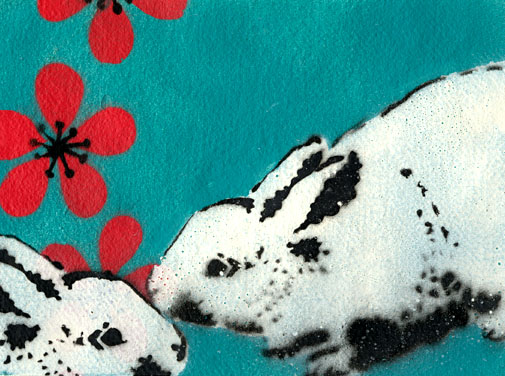
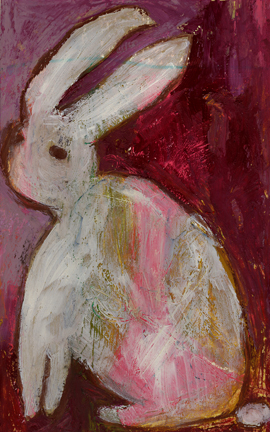
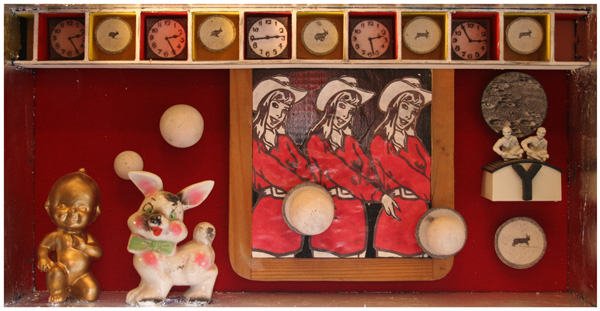
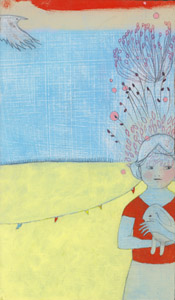
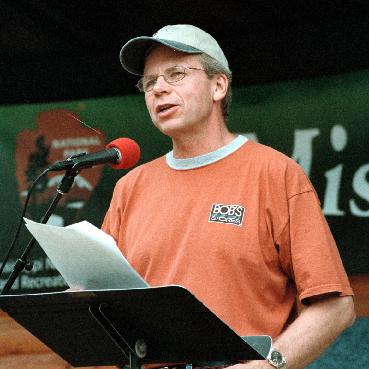
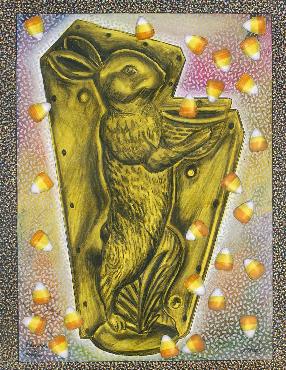
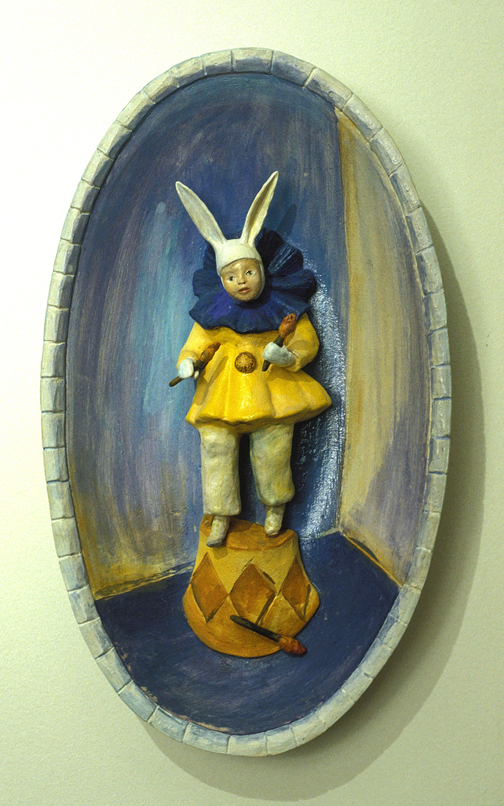
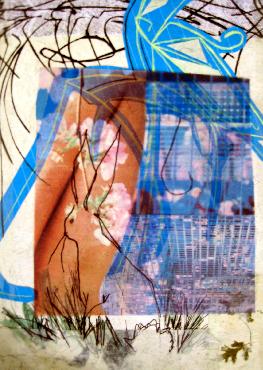
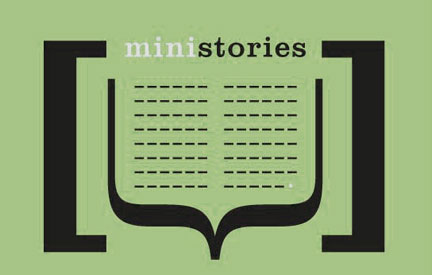
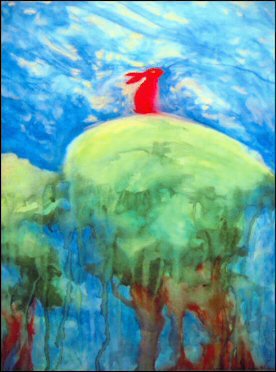
THE LOFT IN RICHARD’S GARAGE BECAME ESPECIALLY ENTICING when I discovered that he had hidden there, in an old, empty, heavy ammunition shell that stood at attention in a dark corner, all of the girlie magazines that he had found at the Stink River Dump. While I was growing up, Richard lived just a few houses away, so when I was out looking for something to do, his place was usually my first stop. Instead of ringing a doorbell or knocking, we always stood near the back door and yelled the name of our friend: “Hey Richard….Hey Richard,” with the last syllable, a descending minor third. If no one answered, I crossed the railroad tracks to the house near the swamp and yelled for Possum. Sometimes Richard and I went to Possum’s together.
We never knew where the tracks originated or how far they went. We did know that a train with an engine, a few cars, and a caboose went past twice a day, to and from somewhere. Usually the car doors were open and the cars, seemingly, empty. The train traveled slowly enough so that we could hide along the embankment at the edge of the tracks and, as the train passed, dig our feet into the crushed rock and gather enough speed to propel us to the train, where we could grab onto one of the ladders on the side of each car, ride until we saw the man in the caboose shaking his fist at us, then drop off and hightail it out of there.
Possum had a shock of wiry, black hair. Instead of going to the barber shop, he sat on a stool in the kitchen while his father put a bowl on his head and cut the hair that the bowl didn’t cover. On the kitchen table was another large bowl always filled with fresh fruit—apples, oranges, bananas, grapes, plums, all of which Possum loved.
He was bigger than the rest of us and had huge feet. In school, he was very smart. Once, on a day when he was absent, a junior high math teacher made the mistake of telling us that the reason Possum was called “the walking brain” was because all of his brains were in his feet.
Possum was passive, not very athletic. In fact, he tried to avoid confrontation and competition. The vacant lot right next to his house belonged to his parents and became our football field when we played with Possum. When we picked sides for a game of tackle, he was always the first to be chosen. In fact, the team that got Possum needed only one other player—someone to hike the ball to him.
Possum was so big and so strong that whenever he carried the ball, he also carried the entire opposing team, who hung on to him wherever they could as they tried to bring him down. He couldn’t really defend himself. He wasn’t very aggressive. He never ran. He walked—head down, big steps, always at the same slow speed—no matter how many were on the other team. He walked like a mammoth opossum carrying her huge babies.
One day in science class, we were studying marsupials and there, right in our science book, was a picture of an opossum, an animal that 70 million years ago shared the Earth with the dinosaurs. An opossum, nicknamed “the living fossil.” An opossum, the only marsupial living in North America. The picture showed an opossum with babies riding on her back. When someone in the class saw the resemblance, we quit calling him Oren, which was his real name, and began to call him Possum.
Possum’s routine after scoring a touchdown was always the same. As soon as he crossed the goal line, he collapsed and lay there on his side as though dead. Just to be gross, with his tongue hanging out of his mouth, he drooled and quietly farted the most unpleasant of farts. His huge babies knew enough to let go and get away as quickly as possible.
Possum collected stamps, a seemingly innocent hobby. His collection of foreign stamps featuring naked women was especially large. I have no idea where he got them. I was certainly not a philatelist. But I can remember lingering with a magnifying glass over the pages of carefully arranged stamps. Possum also had a human anatomy textbook carefully hidden in the insulation in the attic. Even in the heat of summer, Possum’s attic was almost as tempting as Richard’s loft.
Possum’s mother’s name was Opal. We all liked her. She was kind to us, gave us lemonade, freshly-baked cookies, fresh fruit. Around the house, she always dressed the same way—a white t-shirt, short-shorts, nylons with a brown seam up the back, white cotton socks rolled into doughnuts at the ankle, and spike-heeled shoes. Every Sunday she went alone to the early service at the local Methodist church, slipping into the back row of the balcony during the opening hymn and leaving during the closing hymn; only a few people saw the dramatic transformation that took place on Sundays. When she came to church, she was beautiful, in a crisp dress with matching shoes and purse, and hair and make-up that would have turned heads if she had walked down the center aisle.
Possum’s father’s name was Henry. He was a craftsman of unusual skill. He could design and create things of wood that were intricate and without flaw. In the basement he had a workshop equipped with the finest carving tools—chisels and knives, files and rasps, planes and saws. Throughout the house you could see examples of his handiwork, end tables and chairs with delicately carved details.
Sometimes after supper when we stopped at Possum’s, we found his father sitting on the large glider on the back porch reading the evening paper. He’d motion for us to sit next to him, and we knew what that meant. He loved the funnies so much that he wanted to read his favorites to us: Blondie, Beetle Bailey, Gasoline Alley, Li’l Abner, Peanuts. So we sat on either side of him, gliding slowly back and forth as he read and laughed, a beer bottle and a full ashtray nearby.
Henry also drank too much, especially on weekends. We liked Henry when he was sober. When he was drunk, though, we hated him. We feared what he might do to Opal, Possum, and Possum’s little brother. Most of the time, Henry did his drinking at home. Most of the time, Opal was able to leave with the boys if things became too bad. We never knew where they went. They never spoke of these things. We guessed that they returned after Henry had passed out or fallen asleep.
ONCE IN A WHILE, RICHARD AND I PLAYED A GAME with Henry when he was drunk and home alone. We stood outside the house and called, “Hey Henry….Hey Henry.” If he appeared at the door, he’d tell us to go away. We’d say something like, “Try and make us!” If the confrontation became more intense, we began mocking and taunting him, “You can’t catch us! You can’t catch us!” hoping he would become angry enough to chase us. We certainly hadn’t learned this behavior in Sunday School. More likely, the idea came from our being taunted by the bullies at school or in the neighborhood. As far as our game with Henry was concerned, though, it seemed the right thing to do.
If Henry came out of the house, we started to run, but slowly enough so that he was right behind us, his arms flailing, trying to grab one of us. We ran toward the steel clothesline poles, like big Ts in Possum’s backyard, and when we got to the poles, we quickly stepped to the left or right. Of course, we knew that Henry couldn’t negotiate the quick turn, and he usually ran smack into the pole. Or we ran toward the large hedge of pricker bushes north of the house, quickly stepped to the side, and watched Henry run into the wall of thorny spines. He was usually so drunk and so mad that he chased us until we got tired or we thought he had enough, and then we went home.
The one place we didn’t dare run Henry during these games was over the embankment behind the house. Not that the drop-off was so severe, but it was steep and bumpy enough to make an adventure out of sliding to the bottom on large sheets of cardboard cut from refrigerator boxes. On the way down, we had to avoid the mounds of skunk cabbage, with its unpleasant smell and the same kinds of flies and insects that are attracted to carrion, and stop before the swamp at the bottom of the hill.
I remember only one time that I played the game alone and when Possum and Opal were home. A few weeks before Easter, Henry bought two white rabbits for Possum and his brother. He built a large hutch for the rabbits and set it on the south side of the field where we played football. This was no ordinary hutch. At each end was a small house covered with cedar shakes. Above each door leading to the divided wire mesh area was a name burned in a small block of wood—Peter and Beatrice. The roof of each house opened on hinges to make cleaning and replacing the beds of straw easier. And there was a small ladder attached at each end so that Possum’s brother could reach into the cages.
Of course, the ground rules for football games had to be changed a bit, but we didn’t care. Henry had done something nice for Possum and his brother, and we didn’t think that happened very often.
The morning after Easter we were on vacation from school, so I stopped at Richard’s, then I crossed the tracks to see Possum. We decided to feed the rabbits, so we took the bag of pellets and some water and headed to the south side of the football field. To our surprise, the hutch was empty. We checked both houses. No rabbits. We thought that maybe Possum’s brother had taken the rabbits out and forgotten to put them back, so we searched the vacant lot, the yard, the garden. We looked everywhere—in the bared roots of an old stump, in a tangle of vines, in a hollow tree, under the porch, in any cranny we could find. Peter and Beatrice were gone.
We went into the house and asked Opal if she knew anything about the missing rabbits. She said she didn’t, but she thought Henry was in his workshop in the basement and maybe he knew.
We opened the door to the basement and there on the bottom step with his head in his hands was Henry. Halfway down the steps, in the light of the lamp above Henry’s workbench, we saw what was left of the rabbits. They had been skinned. Blood and remains were smeared on the wood. I asked Henry what happened to the rabbits. Clearly enough so that we could understand him, he said, “I ate them.”
I don’t remember what I said then, but it was enough to make him stand and begin lumbering up the stairs. He pushed Possum out of the way. I turned and ran through the kitchen, past a surprised Opal, and out the back door. He was still after me.
On that Monday morning after Easter, I ran Henry into every steel clothesline pole and pricker bush I could find. I ran him into the side of the house. I saw the rabbit skins. I saw the look on Possum’s face. I saw a sick Henry chasing me. I don’t know if Opal and Possum watched from the porch. Maybe Opal was sitting on the basement steps with her arms around her son.
I don’t know why I decided that I should be the one to punish Henry. Some visceral sense of right and wrong, I guess. When he rolled down the embankment behind the house, I thought I must have killed him. Scared to death, I ran home and said nothing.
When I saw Possum in school the next day, I tried to avoid him. I didn’t dare ask about his dad. I was afraid of what he might say. I read the obituaries in the daily newspaper. After a few days I knew that I hadn’t killed him. But I still didn’t know what had happened to him.
From then on, Possum and I didn’t spend much time together. I never went back to his house. We never had classes together. I’d see him in the halls and say, “Hi Oren,” but that was about it. I have no idea why Opal didn’t take the boys and leave, take a train to almost anywhere.
I didn’t spend much time with Richard, either. When real girls came into my life, I may have been miserably inadequate at initiating or maintaining conversation, but I no longer had a need for Richard’s loft or Possum’s attic.
After high school I guess Possum worked in a grocery store for a while. Henry and Opal died years ago. And Possum’s brother, long gone now from the neighborhood.
When I go home to visit, I always drive by Possum’s old house. There’s another family living there. Not much has changed, though. A few coats of paint, I suppose. The vacant lot is still there, overgrown now with thistles and tall wild grasses, their flowering spikes nodding.
My mother says she sees Possum from time to time. Only at night, walking alone, sometimes on the sidewalks of Central Avenue, where, in summer, a frenzy of moths circles the streetlights, perhaps mistaking them for the moon. He walks that same walk. Head down. Big steps and slow. As though the weight of memory will not let go.
About the author: David Bengtson lives in Long Prairie, Minnesota, where he taught English at the high school from 1968-2002. His most recent book is Broken Lines: Prose Poems from Juniper Press in St. Paul.
About the series: miniStories is mnartists.org’s quarterly flash fiction competition. This new literary series is coordinated by Electric Arc Radio’s Geoff Herbach (author of newly released novel, The Miracle Letters of T. Rimburg, published by Three Rivers Press), and it showcases previously unpublished short stories by Minnesota writers. These winning short-short stories are selected by authors, editors, and publishing industry veterans from across the country. Winning miniStories will be published on mnartists.org and in the e-magazine access+ENGAGE. One grand-prize winning author will be selected from each quarter’s miniStories winners by series coordinator Geoff Herbach; the grand-prize winning author will receive a paid commission for a longer-form short story which will be published on mnartists.org.
There will be readings at the Ritz Theater in Minneapolis at the end of each quarter’s contest cycle, at which miniStories winners and judges will read their fiction. An anthology collecting the inaugural year’s miniStories winning fiction will be published in April 2009 and available for sale at area bookstores.
CLICK HERE to read the June 2008 batch of winning miniStories